Bergen's hip-hop scene went mainstream in the '80s. This new exhibit celebrates it
- Oops!Something went wrong.Please try again later.
The Rink, in Bergenfield, may not be the mean streets of L.A., or a burnt-out block in the Bronx.
But here, too, hip-hop happened.
"It was just a general rink, a skating rink, but everybody wanted to be there," said "Teddy Tedd" Whiting, who with his older cousin Special K are The Awesome 2: two of the founding fathers of Bergen County's overlooked, underreported, but pivotal hip-hop scene.
That scene, as you'll learn in "Hip Hop 50 Bergen: Fifty Years of Celebrating the Culture," the exhibit running through April 30 in the upstairs gallery of bergenPAC in Englewood, didn't emerge from city streets and playgrounds.
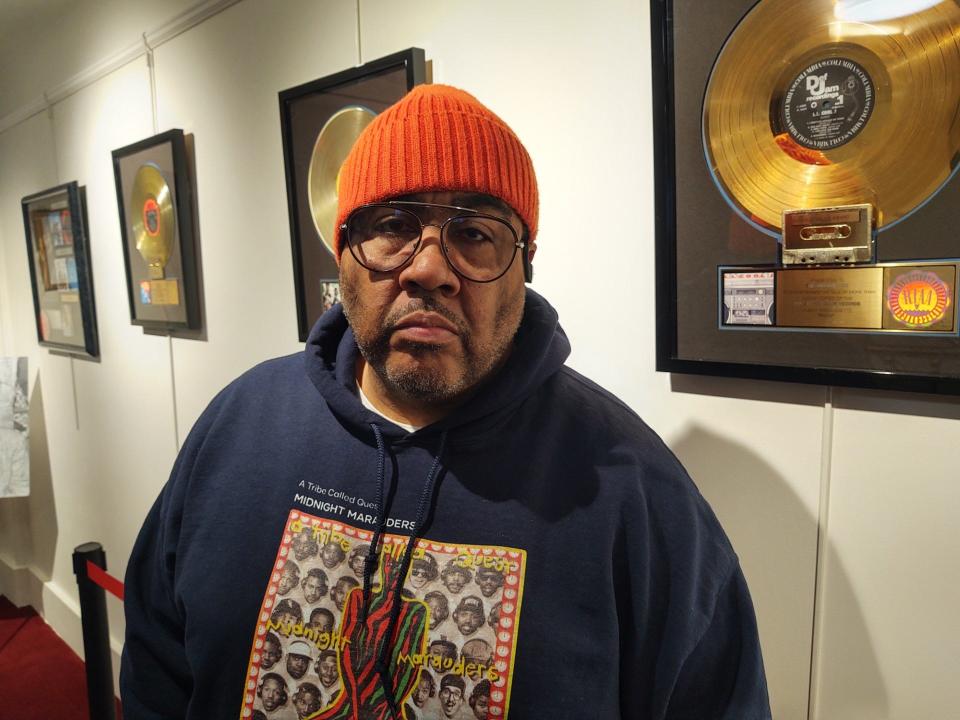
The deejays here — unlike their counterparts in the Bronx — didn't plug their equipment into the municipal light fixtures, to create instant block parties.
In the suburbs, the action took place in more bougie surroundings: Elks Clubs, P.A.L. recreation centers, private parties, and places like The Rink. Which was exactly what it sounds like: a roller skating emporium formerly at 450 South Washington Ave. in Bergenfield.
"It was very noisy, people were going around on skates," said Tedd, co-producer of the bergenPAC show. "But they would stop when the performance started, and it was pretty dope. I think that was the first place on a big scale I headlined."
Souvenirs of an era
Some 30 items, many from Teddy Tedd's private collection, line the walls of bergenPAC's mezzanine this month: framed gold records, posters, photos, jackets, T-shirts, Ampex tapes. All of it relates to the early '80s hip-hop scene in North Jersey.
Some names and and faces will be familiar. Others were known mainly to Bergen clubgoers of 40 years ago. Those are the people that Randy Glover, the Hackensack entrepreneur who conceived, co-produced and curated the show, is really giving a shout-out to.
"I was really interested in giving props to those less familiar performers," said Glover, producing this show through his 501(c)(3) non-profit, All Access Community Development. "I've tried to get this done for a year. I was happy I was able to enlist Teddy Tedd, and then have bergenPAC give it a home."
"Hip Hop 50 Bergen" is an encore, back by popular demand. Originally mounted November to March, the show proved so successful that bergenPAC has brought it back this month. Glover hopes to find a permanent home for it.
"We actually had two receptions for this, an opening reception and one at the beginning of Black History Month," said Helene Cohen, director of events and experiences for bergenPAC. "We had between 75 and 100 people at each reception, which was really cool. And every time a show is on, people would come up to the gallery."
Among the items on display is a jacket emblazoned with the "Sugar Hill" logo. And thereby hangs a tale.
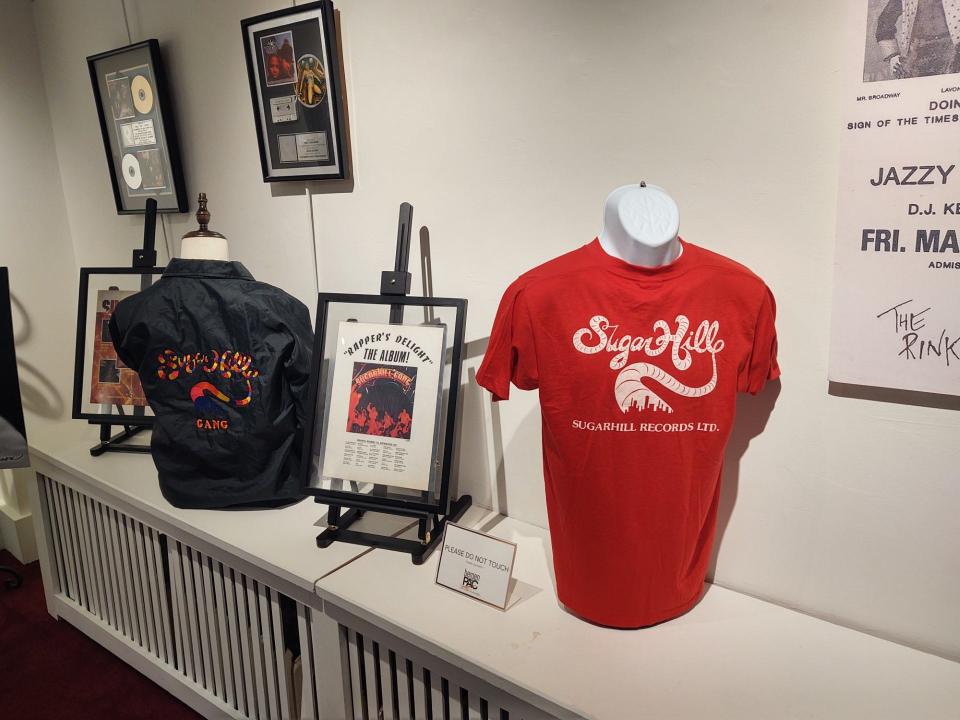
Jersey tends to get slighted in hip-hop history. Rap from the suburbs — seriously? But Bergen, in those early days, had one thing that the the rappers and scratchers from the Bronx could only dream of. A record label.
"Bergen County was actually the place that monetized hip-hop, thanks to Sylvia Robinson and Sugar Hill Records," Glover said.
Sugar Hill changes the game
Sugar Hill Records, founded in 1979 by the wife and husband team of Sylvia and Joe Robinson, had its offices on 96 West Street in Englewood. In 1980, they released hip-hop's first commercial hit, "Rapper's Delight" by the Sugarhill Gang, and then followed that up with the even more sensational "The Message" (1982) and "White Lines" (1983) by Grandmaster Flash and the Furious Five.
Aspiring rappers, on this side of the Hudson, now had something very concrete to aspire to.
"It was just down the street," Teddy Tedd said. "If that didn't inspire you, nothing would. You wanted to be like those [rappers], those guys driving around in Mercedes."
Rap, before Sugar Hill, had mostly circulated on homemade cassettes, purchased on the street. Sugar Hill was the first hip-hop label. Its success paved the way for others: Def Jam, Death Row, Interscope, Cash Money. The Englewood label was a milestone in Black — and female — entrepreneurship.
"My mother believed in longevity," said Leland Robinson, son of the groundbreaking producer (she died in 2011). "She recorded songs that would be here today and here tomorrow as well. That's why the songs are still going on, and the groups are still performing, after 50 years."
Looking ahead with hip-hop
Sugar Hill was also a signpost, pointing the way to hip-hop's future.
"The Message," with its bleak picture of survival in the 'hood, set the agenda: from then on rap would be political, socially conscious, the newspaper of the streets. And many of the superstars that would emerge in this new multimillion-dollar industry, including P. Diddy, Wyclef Jean, Ja Rule, and Lil' Kim, would end up moving to Bergen County — thus bringing the story full circle.
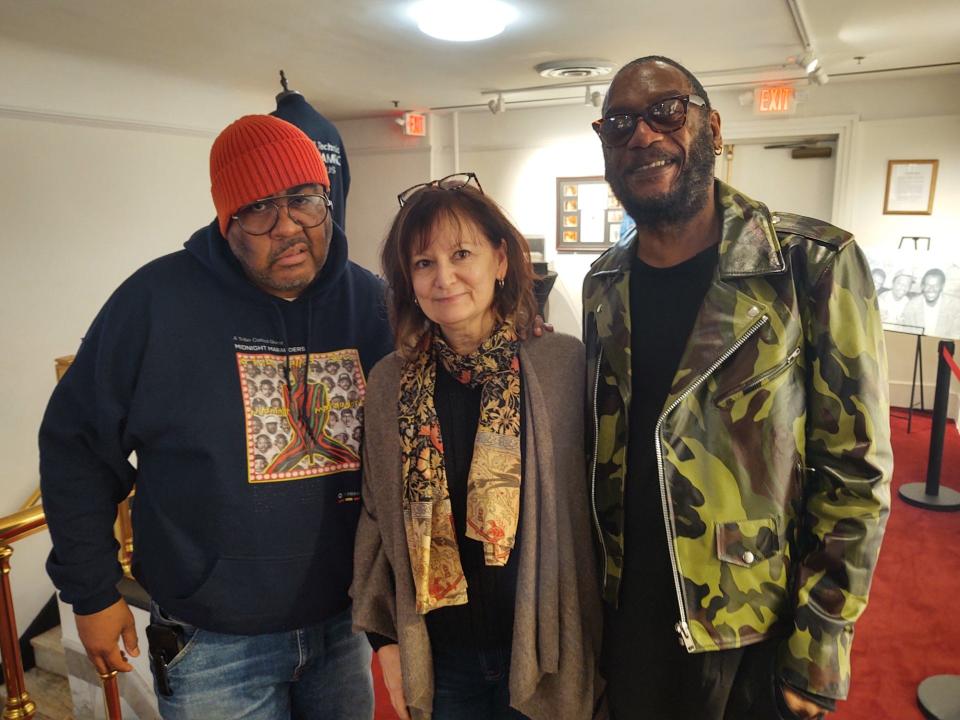
"All these people who were pivotal players in the rap and hip-hop community later became residents of Bergen County," Glover said. "Because it's 10 minutes away from the city. Eight miles."
In those first, flush days of the '80s, Tedd remembers, Bergen County was teeming with rap royalty. You might see Grandmaster Flash walking up the street in Englewood, or Melle Mel cruising down the road in Teaneck.
"Anybody who was on Sugar Hill Records had to come here to do business," said Tedd, a lifelong Hackensack resident. "So you would see The Furious Five, some of The Crash Crew, Kool Moe Dee, anybody who was on Sugar Hill."
More than the music
But "Hip Hop 50 Bergen" isn't just about Sugar Hill, or the stars, or even just the music.
Hip hop is a broad culture that also includes break dancing, fashion, street art (among the exhibits is an original drawing by Keith Haring). This show is also about the dozens of local celebrities who never broke nationally, but helped make the Bergen scene what it was.
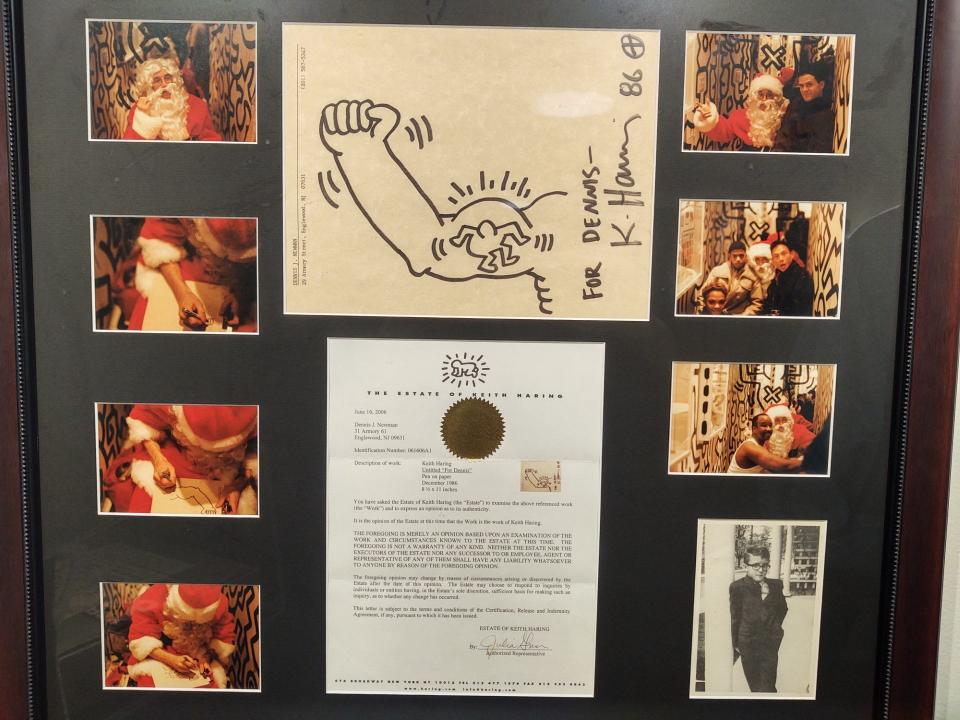
Vice Squad in Passaic. The Lee Crew (named after the jeans) in Englewood. The Breakout Brothers in Hackensack.
"You have all these artists here who might not have had national fame, but they were known locally," Glover said. "They were like the street soldiers of hip-hop. They were in the game, but not on the national level. They were known to the community. They were neighborhood celebrities."
In November, some 40 to 50 of these unsung rap heroes — among them, Tedd and Special K — got congressional and county certificates, through Glover's corporation. It was belated recognition for their pioneering work. More, it was a recognition of Bergen's place in hip-hop history.
"New York speaks the loudest, but that doesn't necessarily mean it has the most going on," Glover said. "There was a whole scene here."
And no one kept better tabs on the scene than Teddy Tedd and Special K, the still-working, still-awesome Awesome 2.
Getting around
Tedd and Special K, as deejay and "hype man" (the guy who gets the crowd amped up, as opposed to the rapper who does the rhyming) worked parties on both sides of the river for years. They did shows at Madison Square Garden, also at premier clubs like The Roxy, The Tunnel, The Latin Quarter in Manhattan, and Disco Fever in the Bronx.
They also did the honors at Leland Robinsons' birthday party — his 16th, if Tedd recalls rightly. That was his entrée into the whole Sugar Hill scene.
"I had started to become a very popular deejay locally, so on his birthday, he had me come deejay at his house," Tedd said. "That was mind-blowing for me, even though I lived right here in Hackensack. I'd never been in a house like his. That was amazing."
On radio, "The Awesome 2 Show" started at Newark's WHBI in 1982 (the station was later rechristened WNWK), then migrated to Sirius XM. Now they're streaming on ScratchVision (Fridays 8 p.m.) and on Rapstation, Chuck D's platform (Tuesdays and Fridays at 7). Over the years, this duo has introduced many records, and helped others become hits. On July 17, they'll be doing their own hip-hop celebration at Englewood's Night Market street fair.
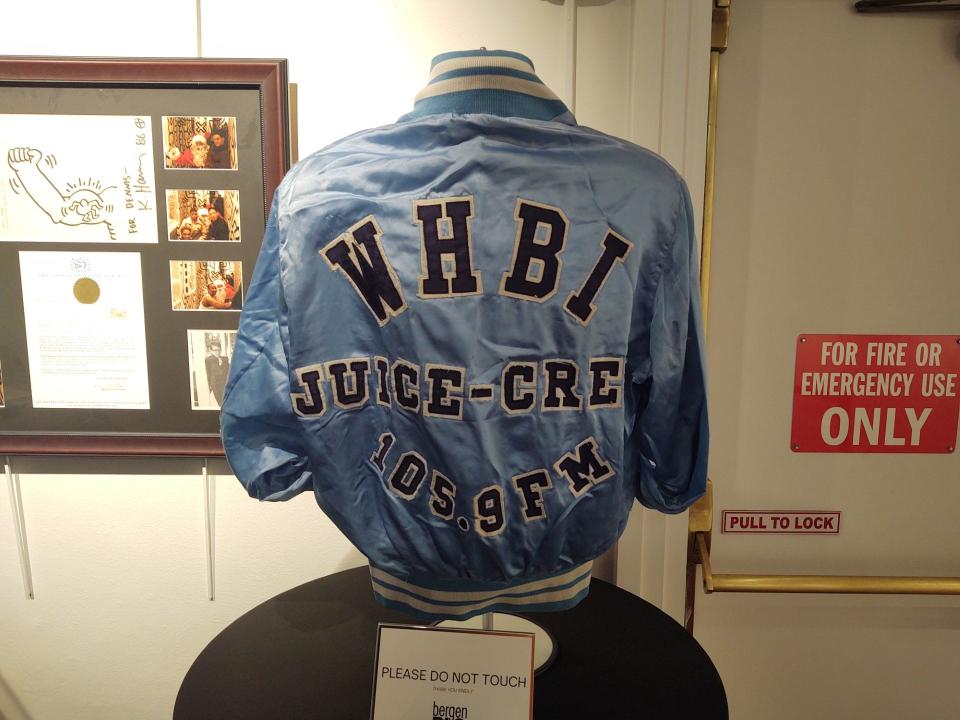
For 40 years, from their radio grandstand, they've seen all of hip-hop's passing parade. But they'll always lead the cheering section for Bergen.
"You had pretty much the same thing here as in the Bronx," Tedd said. "You had crews over here, in Bergen County, Passaic County. We were doing the same thing. It didn't start here, but as soon as we understood it, we were doing it everywhere."
If you go...
"Hip Hop 50 Bergen: Fifty Years of Celebrating the Culture," at bergenPAC, 30 N. Van Brunt Street, Englewood, through April 30. 201 227-1030 or begenpac.org.
This article originally appeared on NorthJersey.com: Hip-hop's Bergen County roots celebrated at bergenPAC exhibit

